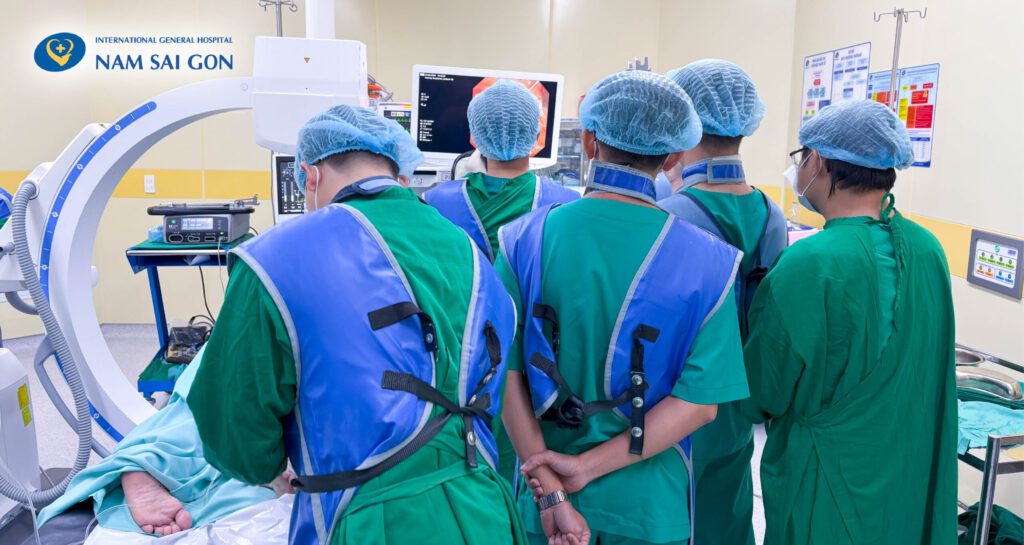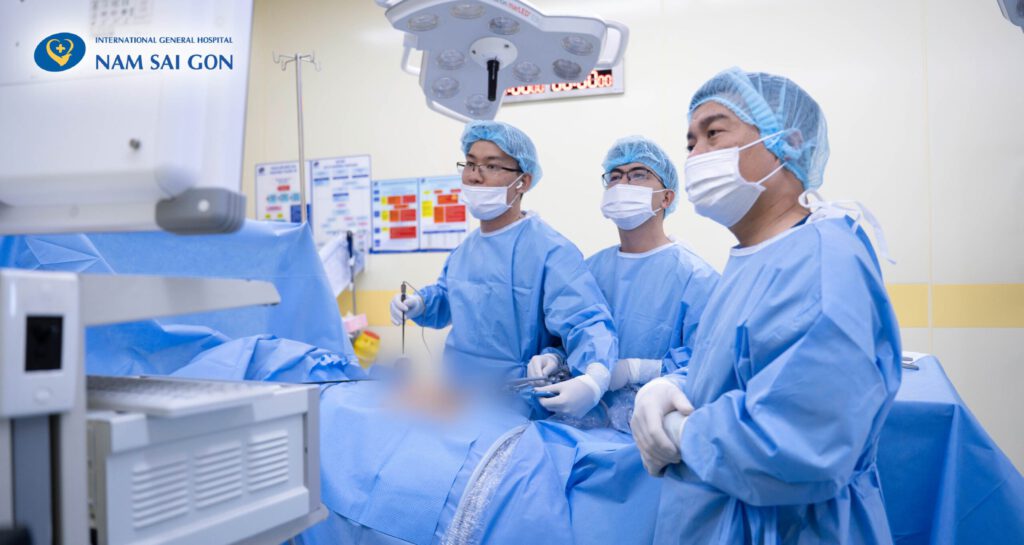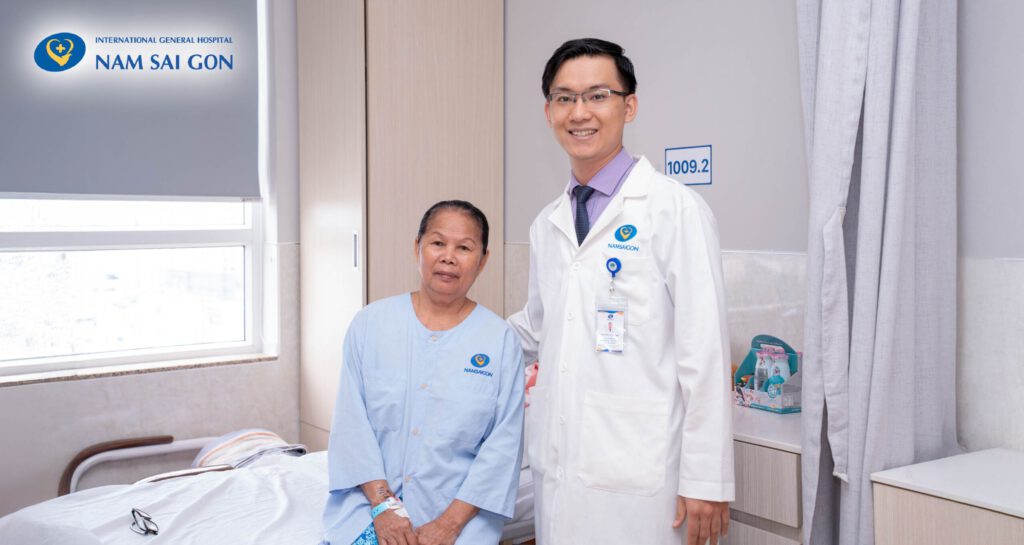TREATMENT OF GALLSTONES USING ENDOSCOPIC RETROGRADE CHOLANGIOPANCREATOGRAPHY (ERCP)
-
Author: BỆNH VIỆN ĐA KHOA QUỐC TẾ NAM SÀI GÒN
-
01/07/2025
-
614
Nam Sai Gon International General Hospital has successfully applied Endoscopic Retrograde Cholangiopancreatography (ERCP) — a modern technique that effectively treats biliary and pancreatic conditions such as bile duct stones, strictures, and pancreatic disorders — for a 72-year-old patient with multiple comorbidities.
Admission of an elderly patient with bile duct and gallbladder stones
A 72-year-old female patient was admitted to Nam Sai Gon International General Hospital at 11:00 p.m. with persistent epigastric pain accompanied by nausea and frequent vomiting. She had previously sought treatment at a local hospital and was prescribed medication, but her symptoms did not improve.
Emergency examination and diagnostic imaging revealed acute cholangitis caused by common bile duct stones, along with gallstones. The patient also had multiple comorbidities, including diabetes and mitral/tricuspid valve regurgitation. After multidisciplinary consultation, the General Surgery Department admitted the patient for stabilization of the cholangitis and management of organ dysfunctions. A combined procedure was then performed: ERCP for stone extraction and laparoscopic cholecystectomy in a single session to ensure complete treatment and prevent recurrence or complications.
Minimally invasive ERCP – An optimal solution for high-risk patients
Dr. Nguyen Quoc Vinh, PhD – Head of the General Surgery Department at Nam Sai Gon International General Hospital – shared: “Among various treatment methods for bile duct stones, ERCP is considered the optimal approach due to its minimally invasive nature. It is especially beneficial for elderly patients with multiple comorbidities, as it minimizes surgical risks and avoids open procedures”.

During ERCP, the endoscope is inserted through the mouth, esophagus, and stomach to reach the duodenum, where the bile duct opens via the Vater’s papilla. A thin catheter is then passed through the scope into the bile duct to inject contrast for X-ray imaging and remove stones — all without any abdominal incision. The procedure is quick, painless, and has minimal complications, allowing for rapid recovery.
“The most critical step in ERCP is successfully accessing the bile duct through the Vater’s papilla, which can be technically challenging and requires significant expertise. Accurate localization, sizing, and extraction of stones demand skill to ensure safe and effective outcomes without complications” — explained by Dr. Nguyen Van Be, Specialist Level I.
Combining two procedures: Cost-effective and faster recovery
The two-hour procedure was performed by a collaborative team from the General Surgery Department and Gastrointestists, including Dr. Nguyen Quoc Vinh (PhD), Dr. Nguyen Vu Quang (MMed, Specialist Level I), and Dr. Nguyen Van Be (Specialist Level I).

“Performing ERCP and laparoscopic cholecystectomy in a single session allowed the patient to undergo anesthesia just once, which significantly reduced treatment time and cost more than performing the two procedures separately”, shared Dr. Vinh. “This approach ensures complete removal of gallstones and definitive treatment.“

Compared to traditional open surgery, this combined procedure required only three small incisions, each a few millimeters in size. Then, the patient experienced minimal postoperative pain and recovered quickly — able to eat within 24 hours and was discharged the next day.
Endoscopic Retrograde Cholangiopancreatography (ERCP) is an advanced technique adopted by major medical centers in Vietnam and globally for managing complex hepatobiliary and pancreatic conditions. Beyond gallstones, it is also effective for treating acute pancreatitis, pancreatic tumors, and bile duct strictures.
Compared to conventional open surgery, the combined ERCP – laparoscopic approach offers:
|
Don’t take gallstones lightly
Gallstones may be asymptomatic or cause abdominal pain, fever, or jaundice. If you experience any of these symptoms, consult a specialist promptly for proper diagnosis and treatment.
Undiagnosed and untreated gallstones can lead to serious complications such as acute cholecystitis, gallbladder abscess, acute pancreatitis, cholangitis, bile duct obstruction, or even sepsis — which can be life-threatening.
The successful implementation of ERCP at Nam Sai Gon International General Hospital marks a significant advancement in the diagnosis and treatment of hepatobiliary diseases. Recognized as the “gold standard” for managing bile duct stones, ERCP also plays a key role in diagnosing biliary obstructions due to cancer and other pancreatic disorders.
If you experience unusual symptoms involving the digestive, liver, or pancreatic systems, contact Nam Sai Gon International General Hospital for timely consultation and care.
Nam Sai Gon International General Hospital
No. 88, Street No. 8, Trung Son Residential Area, Binh Hung Commune, Ho Chi Minh City.
Hotline: 18006767
info@nih.com.vn
Last updated: 09:38 01/12/2025






